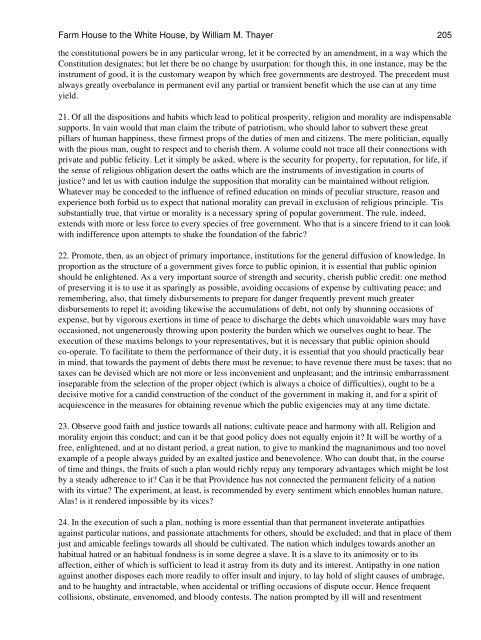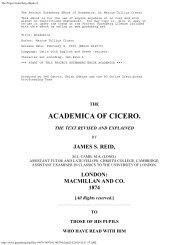From Farm House to the White House - 912 Freedom Library
From Farm House to the White House - 912 Freedom Library
From Farm House to the White House - 912 Freedom Library
You also want an ePaper? Increase the reach of your titles
YUMPU automatically turns print PDFs into web optimized ePapers that Google loves.
<strong>Farm</strong> <strong>House</strong> <strong>to</strong> <strong>the</strong> <strong>White</strong> <strong>House</strong>, by William M. Thayer 205<br />
<strong>the</strong> constitutional powers be in any particular wrong, let it be corrected by an amendment, in a way which <strong>the</strong><br />
Constitution designates; but let <strong>the</strong>re be no change by usurpation: for though this, in one instance, may be <strong>the</strong><br />
instrument of good, it is <strong>the</strong> cus<strong>to</strong>mary weapon by which free governments are destroyed. The precedent must<br />
always greatly overbalance in permanent evil any partial or transient benefit which <strong>the</strong> use can at any time<br />
yield.<br />
21. Of all <strong>the</strong> dispositions and habits which lead <strong>to</strong> political prosperity, religion and morality are indispensable<br />
supports. In vain would that man claim <strong>the</strong> tribute of patriotism, who should labor <strong>to</strong> subvert <strong>the</strong>se great<br />
pillars of human happiness, <strong>the</strong>se firmest props of <strong>the</strong> duties of men and citizens. The mere politician, equally<br />
with <strong>the</strong> pious man, ought <strong>to</strong> respect and <strong>to</strong> cherish <strong>the</strong>m. A volume could not trace all <strong>the</strong>ir connections with<br />
private and public felicity. Let it simply be asked, where is <strong>the</strong> security for property, for reputation, for life, if<br />
<strong>the</strong> sense of religious obligation desert <strong>the</strong> oaths which are <strong>the</strong> instruments of investigation in courts of<br />
justice? and let us with caution indulge <strong>the</strong> supposition that morality can be maintained without religion.<br />
Whatever may be conceded <strong>to</strong> <strong>the</strong> influence of refined education on minds of peculiar structure, reason and<br />
experience both forbid us <strong>to</strong> expect that national morality can prevail in exclusion of religious principle. 'Tis<br />
substantially true, that virtue or morality is a necessary spring of popular government. The rule, indeed,<br />
extends with more or less force <strong>to</strong> every species of free government. Who that is a sincere friend <strong>to</strong> it can look<br />
with indifference upon attempts <strong>to</strong> shake <strong>the</strong> foundation of <strong>the</strong> fabric?<br />
22. Promote, <strong>the</strong>n, as an object of primary importance, institutions for <strong>the</strong> general diffusion of knowledge. In<br />
proportion as <strong>the</strong> structure of a government gives force <strong>to</strong> public opinion, it is essential that public opinion<br />
should be enlightened. As a very important source of strength and security, cherish public credit: one method<br />
of preserving it is <strong>to</strong> use it as sparingly as possible, avoiding occasions of expense by cultivating peace; and<br />
remembering, also, that timely disbursements <strong>to</strong> prepare for danger frequently prevent much greater<br />
disbursements <strong>to</strong> repel it; avoiding likewise <strong>the</strong> accumulations of debt, not only by shunning occasions of<br />
expense, but by vigorous exertions in time of peace <strong>to</strong> discharge <strong>the</strong> debts which unavoidable wars may have<br />
occasioned, not ungenerously throwing upon posterity <strong>the</strong> burden which we ourselves ought <strong>to</strong> bear. The<br />
execution of <strong>the</strong>se maxims belongs <strong>to</strong> your representatives, but it is necessary that public opinion should<br />
co-operate. To facilitate <strong>to</strong> <strong>the</strong>m <strong>the</strong> performance of <strong>the</strong>ir duty, it is essential that you should practically bear<br />
in mind, that <strong>to</strong>wards <strong>the</strong> payment of debts <strong>the</strong>re must be revenue; <strong>to</strong> have revenue <strong>the</strong>re must be taxes; that no<br />
taxes can be devised which are not more or less inconvenient and unpleasant; and <strong>the</strong> intrinsic embarrassment<br />
inseparable from <strong>the</strong> selection of <strong>the</strong> proper object (which is always a choice of difficulties), ought <strong>to</strong> be a<br />
decisive motive for a candid construction of <strong>the</strong> conduct of <strong>the</strong> government in making it, and for a spirit of<br />
acquiescence in <strong>the</strong> measures for obtaining revenue which <strong>the</strong> public exigencies may at any time dictate.<br />
23. Observe good faith and justice <strong>to</strong>wards all nations; cultivate peace and harmony with all. Religion and<br />
morality enjoin this conduct; and can it be that good policy does not equally enjoin it? It will be worthy of a<br />
free, enlightened, and at no distant period, a great nation, <strong>to</strong> give <strong>to</strong> mankind <strong>the</strong> magnanimous and <strong>to</strong>o novel<br />
example of a people always guided by an exalted justice and benevolence. Who can doubt that, in <strong>the</strong> course<br />
of time and things, <strong>the</strong> fruits of such a plan would richly repay any temporary advantages which might be lost<br />
by a steady adherence <strong>to</strong> it? Can it be that Providence has not connected <strong>the</strong> permanent felicity of a nation<br />
with its virtue? The experiment, at least, is recommended by every sentiment which ennobles human nature.<br />
Alas! is it rendered impossible by its vices?<br />
24. In <strong>the</strong> execution of such a plan, nothing is more essential than that permanent inveterate antipathies<br />
against particular nations, and passionate attachments for o<strong>the</strong>rs, should be excluded; and that in place of <strong>the</strong>m<br />
just and amicable feelings <strong>to</strong>wards all should be cultivated. The nation which indulges <strong>to</strong>wards ano<strong>the</strong>r an<br />
habitual hatred or an habitual fondness is in some degree a slave. It is a slave <strong>to</strong> its animosity or <strong>to</strong> its<br />
affection, ei<strong>the</strong>r of which is sufficient <strong>to</strong> lead it astray from its duty and its interest. Antipathy in one nation<br />
against ano<strong>the</strong>r disposes each more readily <strong>to</strong> offer insult and injury, <strong>to</strong> lay hold of slight causes of umbrage,<br />
and <strong>to</strong> be haughty and intractable, when accidental or trifling occasions of dispute occur. Hence frequent<br />
collisions, obstinate, envenomed, and bloody contests. The nation prompted by ill will and resentment















